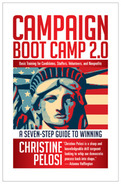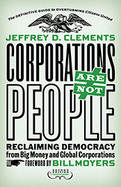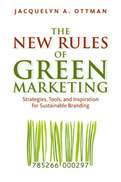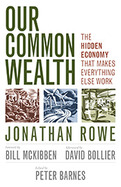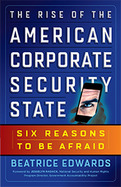- Detailed, practical advice on how to win any kind of campaign
- Written by a veteran activist with a lifetime of experience running campaigns at every level
- Updated throughout, including new information on using social media, challenges unique to women, and the power of volunteers
My political activism began in the stroller, writes Christine Pelosi. As the daughter of Congresswoman and former House Speaker Nancy Pelosi, Christine is almost literally a born campaigner. She knows politics and policy inside out: shes served as an attorney in the Clinton-Gore administration, on Capitol Hill as a Congressional chief of staff, and as a San Francisco prosecutor. She has conducted boot camps in over thirty states and in three countries, working with dozens of successful candidates for office from city council to US congress. In Campaign Boot Camp 2.0, Pelosi presents leadership lessons from the campaign trail from a diverse array of over forty public figures, lending advice for anyone who wants to run for office, advocate for a cause, or win a public policy issue.
Campaign Boot Camp 2.0 is basic training for future leaders who hear a call to servicea voice of conscience that springs from vision, ideas, and valuesand want to translate that call into positive change. Pelosi offers the seven essential steps to winning: identify your call to service, define your message, know your community, build your leadership teams, raise the money, connect with people, and mobilize to win. Each chapter concludes with a Get Real exercise so readers can personalize and integrate these ideas into individual efforts.
In this edition, Pelosi updates the books Call to Service examplesprofiles of current political leaders and what motivated them to enter public service; details the expanding role of social media, the Internet, and technology as message multipliers; explores challenges unique to women candidates; and expands on the power of volunteers.
- A plain-English guide to the disastrous practical consequences of the bizarre legal doctrine of corporate personhood enshrined most recently in the Supreme Courts Citizens United decision
- Features a constitutional amendment designed to overturn Citizens United and restore the government to the people
- Includes a tool kit to help citizens mount a grassroots campaign to pass the Peoples Rights amendment
- Click here for the press release
The January 2010 Supreme Court Citizens United v. Federal Election Commission decisionmarked a culminating victory for the legal doctrine of corporate personhood. Corporations, as legal persons, are now entitled to exercise their alleged free-speech rights in the form of campaign spending, effectively enabling corporate domination of the electoral process.
Jeffrey Clements uncovers the roots, expansion, and far-reaching effects of the strange and destructive idea, which flies in the face of not only all common sense but, Clements shows, most of American legal history, from 1787 to the 1970s. He details its impact on the American political landscape, economy, job market, environment, and public healthand how it permeates our daily lives, from the quality of air we breathe to the types of jobs we can get to the politicians we elect. Most importantly, he offers a solution: a constitutional amendment to reverse Citizens United and tools readers can use to mount a grassroots drive to get it passed.
Overturning Citizens United is not about a triumph of one political ideology over anotherits about restoring the democratic principles on which America was built. Republican president Theodore Roosevelt and conservative Supreme Court Chief Justice William Rehnquist both vocally opposed the idea of corporate personhood. Community by community, state by state, we can cross party and ideological lines to form a united front against unchecked corporate power in Americaand reinstate a government that is truly of, by, and for the people.
Drawing on the latest poll data and incorporating lessons learned from her clients and other leading sustainable brands -- including GE, Nike, Method, Starbucks, Timberland, HP, NatureWorks, Procter & Gamble, Stonyfield Farm, and Wal-Mart -- Ottman provides practical strategies, tools, and inspiration for building every aspect of a credible value-based green marketing strategy. She covers such topics as spurring innovation through a proactive approach to sustainability, developing products that are green throughout their life cycle, communicating credibly to avoid accusations of "greenwashing," teaming up with stakeholders to maximize outreach to consumers, taking advantage of social media, and much more.
The New Rules of Green Marketing captures the best of Ottman's two previous groundbreaking books on green marketing and places it within a 21st Century context. Focusing on a new generation of marketers who likely grew up with an appreciation for sustainability, it provides in one place essential strategies, tools, and inspiration for connecting effectively with mainstream consumers.
-
By a trailblazing expert in green marketing
-
Demonstrates how to effectively market green to mainstream consumers
-
Filled with success stories from sustainability leader including Ottman's Fortune 500 and entrepreneurial clients
- Click Here for Press Release
Green products have been around since the 1970s, but it's only in recent years that they've become ubiquitous. That's because savvy green marketers are no longer targeting "deep green" consumers with a "save the planet" pitch. Instead, they're promoting the added value their products provide: better health, superior performance, good taste, or cost-effectiveness. In this innovative book Ottman argues that emphasizing primary benefits -- the New Rules -- is critical to winning over the mainstream consumer.
Drawing on the latest poll data and incorporating lessons learned from her clients and other leading sustainable brands -- including GE, Nike, Method, Starbucks, Timberland, HP, NatureWorks, Procter & Gamble, Stonyfield Farm, and Wal-Mart -- Ottman provides practical strategies, tools, and inspiration for building every aspect of a credible value-based green marketing strategy. She covers such topics as spurring innovation through a proactive approach to sustainability, developing products that are green throughout their life cycle, communicating credibly to avoid accusations of "greenwashing," teaming up with stakeholders to maximize outreach to consumers, taking advantage of social media, and much more.
The New Rules of Green Marketing captures the best of Ottman's two previous groundbreaking books on green marketing and places it within a 21st Century context. Focusing on a new generation of marketers who likely grew up with an appreciation for sustainability, it provides in one place essential strategies, tools, and inspiration for connecting effectively with mainstream consumers.
2013
A huge part of our economy is invisible, invaluable, and under siege. This book describes a growing movement to recognize and defend the commons on many fronts: community initiatives, legal actions, and visionary proposals.
Why We Need the Commons A huge part of our economy is invisible, invaluable, and under siege. This is “the commons,” a term that denotes everything we share. Some parts of the commons are gifts of nature: the air and oceans, the web of species, wilderness, and watersheds. Others are the product of human creativity and endeavor: sidewalks and public spaces, the Internet, our languages, cultures, and technologies. Jonathan Rowe illuminates the scale and value of the commons, its symbiotic relationship with the rest of our economy, its importance to our personal and planetary well-being, and how it is threatened by privatization and neglect. He unifies many seemingly disparate struggles—against pollution, excessive development, corporate marketing to children, and more—with the force of this powerful idea. And he calls for new institutions that create a durable balance between the commons and the profit-seeking side of our economy. “This elegant book is a wonderful introduction to the originality of thought, clarity of expression, and humanity of vision that made Jonathan Rowe so respected by those who knew him. It will change the way you think about economic, environmental and social problems and how to solve them. “ — James Fallows, national correspondent, The Atlantic “Jonathan Rowe describes the emerging movement to protect the vast commonwealth owned by the people. Gird yourself to see nature and human ingenuity in a very different light. Then open these pages and a whole new world will come into focus.” —Ralph Nader “There is an economics of common wealth. Common wealth can and must be managed. That is Jon Rowe’s gift to us.” --George Lakoff, Professor of Cognitive Science and Linguistics, University of California at Berkeley and author of Don’t Think of an Elephant- Identifies an essential but overlooked and endangered sector of our economy
- Beautifully writtenclear, accessible, poetic
- Filled with examples of what can be done to protect, nurture, and share our common wealth
- Click here for the press release
A huge part of our economy is invisible, invaluable, and under siege. "The commons" is a term that denotes everything we share as opposed to own privately. Some parts of the commons are gifts of nature: the air and oceans, the web of species, wilderness, and watersheds. Others are the product of human creativity and endeavor: sidewalks and public squares, the Internet, our languages, cultures, technologies, and infrastructure. In graceful and down-to-earth prose, Jonathan Rowe illuminates the scale and value of the commons, its symbiotic relationship with the rest of the economy, its importance to our personal and planetary well-being, and how it is threatened by privatization and neglect.
Rowe also describes a growing movement to recognize and defend the commons on many fronts: community initiatives, legal actions, and visionary proposals such as a sky trust to charge polluters and distribute the proceeds to all of us. Simple gestures can be powerful too: Rowe relates how he set some benches in a vacant lot and watched a public gathering space take shape.
For decades, people have defended the commons and not known it. Theyve battled pollution, development, corporate marketing assaults on their kids, and many other attacks on common wealth. Whats been missing is a story that unifies all these seemingly unrelated battles with the force of a powerful idea. This is what Jonathan Rowe provides in this thought-provoking book.
Edward Snowden's dramatic NSA revelations are only the tip of an iceberg that threatens to sink the Constitution.
In the United States today we have good reasons to be afraid. Our Bill of Rights is no more. It has been rendered pointless by heavy surveillance of average citizens, political persecution of dissenters, and the potential of indefinite detention now codified into law. Our democracy and freedoms are impaired daily by government control of information, systemic financial corruption, unfettered corporate influence in our elections, and by corporate-controlled international institutions. The Constitution of The United States that has shielded us for more than 200 years from the tentacles of oppressive government and the stranglehold of private wealth becomes more meaningless with each new act of corporate-ocracy.
Behind a thinning veneer of democracy, the Corporate Security State is tipping the balance between the self-interest of a governing corporate elite and the rights of the people to freedom, safety and fairness. The consequences of these trends and conditions are devastating. We are submerged in endless war, and the wealth produced by and in the United States skews upward in greater concentrations every year. The middle class is under financial attack, as Washington prepares to loot Social Security and Medicare to finance the insatiable war-making and profit-taking.
Repression descends on a people slowly at first, but then crushes quickly, silencing dissent. According to the author of Rise of The American Corporate Security State, Beatrice Edwards, our task now is to recognize the real reasons to be afraid in 21st century America, and address them. Our early steps in the right direction may be small ones, but they are important. They are based on the principle that we, as Americans, have a right to know what our government is doing and to speak openly about it. Creeping censorship, secret courts, clandestine corporate control are all anathema to democratic practices and must be corrected now, before this last chance to redeem our rights is lost.
2008
Refutes myths about video game violence, antisocial content, and addiction
Video games have been a source of controversy in the media almost since their invention. At best, these digital diversions are thought of as trivial, childish obsessions. At worst, they are attacked as violent, antisocial, corrupting, and dangerous to our youth. But as Rusel DeMaria shows, video games may represent one of the most powerful learning technologies ever invented. He turns the controversy on its head and shows the positive potential of the much-maligned video game to inspire, motivate, and teach. DeMaria delves deeply into the realities of the gaming world, analyzing both the business forces driving game development and the unique qualities that distinguish video games from all other popular media. Drawing on the latest research on play and learning, he explains that it is precisely these qualities--a combination DeMaria calls the "magic edge"--that make video games such potentially powerful tools. He shows how games can be designed to integrate content that educates, inspires, motivates, and empowers players--even as they lure them in with their drama and thrill them with special effects--and offers numerous examples of popular games that do just that. He even offers a primer to help curious non-gamers begin to explore the gaming world and discover the positive potential of games for themselves. DeMaria presents video games in a new light and details many of the ways they can facilitate learning. Because millions of people are playing games all around the world, we owe it to ourselves to utilize their positive power to spark imaginations and make learning fun for our own kids and for gamers around the world.- Refutes myths about video game violence, antisocial content, and addiction
- Reveals how video games can become a force for positive personal and social change
- Written by a video game expert whose books have sold over two million copies


